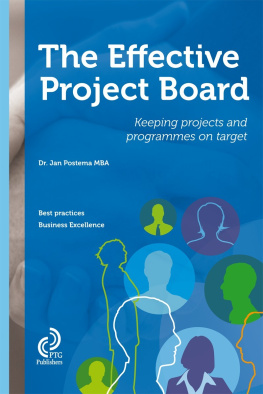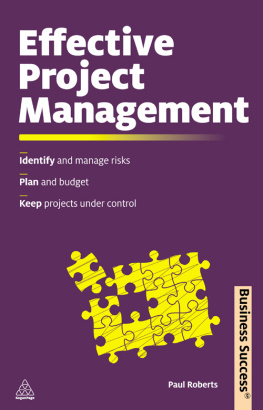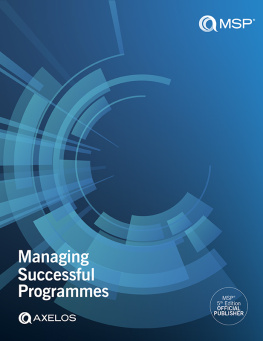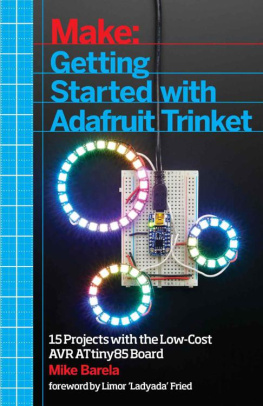Hasselt Marita van - The effective project board: keeping projects and programmes on target
Here you can read online Hasselt Marita van - The effective project board: keeping projects and programmes on target full text of the book (entire story) in english for free. Download pdf and epub, get meaning, cover and reviews about this ebook. City: Epe, year: 2016, publisher: PTG Publishers;PTG Uitgevers, genre: Business. Description of the work, (preface) as well as reviews are available. Best literature library LitArk.com created for fans of good reading and offers a wide selection of genres:
Romance novel
Science fiction
Adventure
Detective
Science
History
Home and family
Prose
Art
Politics
Computer
Non-fiction
Religion
Business
Children
Humor
Choose a favorite category and find really read worthwhile books. Enjoy immersion in the world of imagination, feel the emotions of the characters or learn something new for yourself, make an fascinating discovery.
- Book:The effective project board: keeping projects and programmes on target
- Author:
- Publisher:PTG Publishers;PTG Uitgevers
- Genre:
- Year:2016
- City:Epe
- Rating:5 / 5
- Favourites:Add to favourites
- Your mark:
- 100
- 1
- 2
- 3
- 4
- 5
The effective project board: keeping projects and programmes on target: summary, description and annotation
We offer to read an annotation, description, summary or preface (depends on what the author of the book "The effective project board: keeping projects and programmes on target" wrote himself). If you haven't found the necessary information about the book — write in the comments, we will try to find it.
The effective project board: keeping projects and programmes on target — read online for free the complete book (whole text) full work
Below is the text of the book, divided by pages. System saving the place of the last page read, allows you to conveniently read the book "The effective project board: keeping projects and programmes on target" online for free, without having to search again every time where you left off. Put a bookmark, and you can go to the page where you finished reading at any time.
Font size:
Interval:
Bookmark:
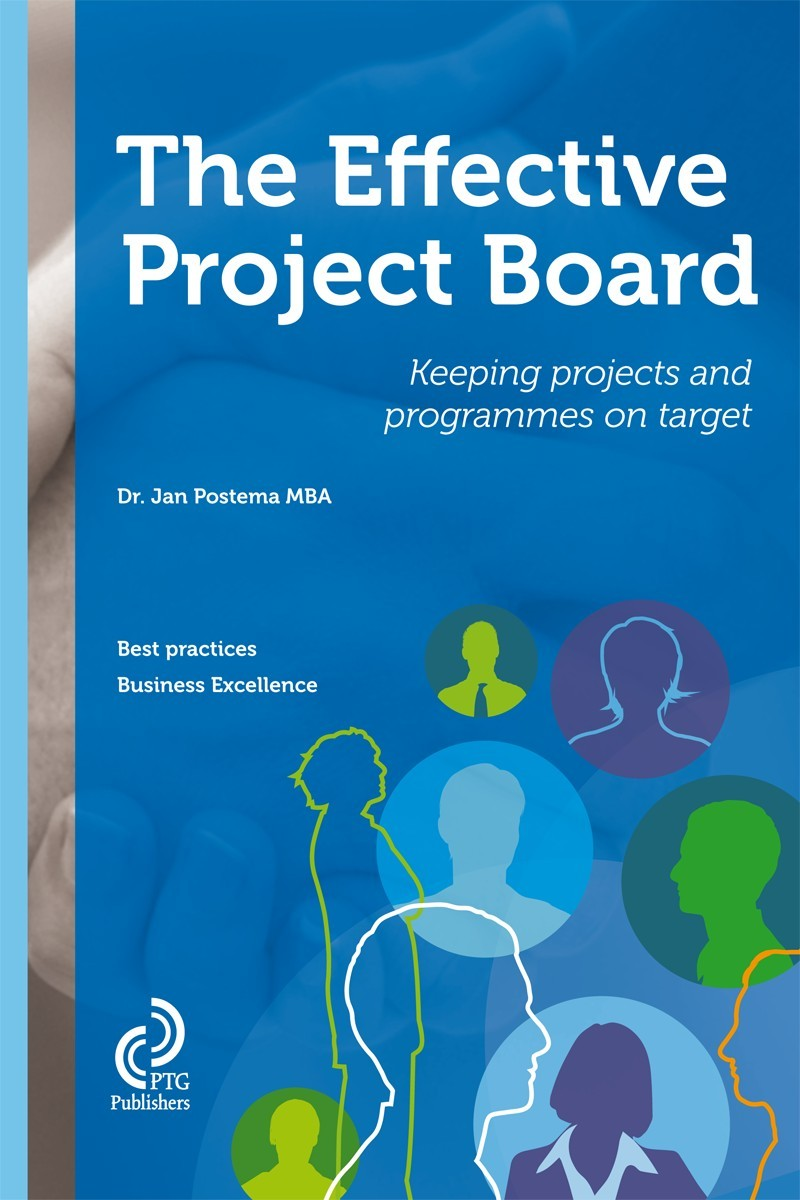
The Effective Project Board
KEEPING PROJECTS AND PROGRAMMES ON TARGET
First edition
J. Postema

2016 J. Postema
Published by PTG Publishers B.V.
www.ptguitgevers.nl
www.learningPMonline.com
The series Best Practices in Business Excellence presents written and digital publications for professional development in senior management. Providing a minimum of theory and a maximum of practical guidelines, you will gain a wealth of information and skills in a short notice. In addition, the books are ideal as a reference.
1st edition: March 2016
ISBN 978-94-91490-04-0 (paperback)
ISBN 978-94-91490-08-8 (e-book)
NUR 801
Publisher: Ten Gevers
Cover and illustrations: Gumtree
Editor: Marita van Rijssen
E-book: Mat-Zet bv, Soest
All rights reserved. No part of this publication may be reproduced, stored in a retrieval system,
or transmitted in any form or by any means, electronic, mechanical, photocopying, recording or
otherwise without the written permission of the publisher.
PRINCE2 and MSP are registered trade marks of AXELOS Limited.
Stakeholder Circle is a trade mark of Stakeholder Management Pty Ltd.
Preface
This book originates from a workshop my colleague Erik Knapen and I provided to our management. We based the workshop on our own experience with project boards and on that of our colleagues. Our shared experiences strengthened us in our belief that the subject of project boards lacked sufficient and explicit attention in common project management or management literature. We thought this was strange, since project boards are considered essential for project success, or failure, for that matter.
The workshop was received well and people suggested that we do it more often, and for a broader audience. That induced me take a closer look at the subject, which resulted in two articles. Still, I felt there was more to say about the subject. As a management team member of IPMA-NLs Dutch National Research Group in project management, I had toyed with the idea of compiling selected chapters on project management related subjects. Based on my workshop experiences, project boards seemed an appropriate first subject. When I ran into Ten Gevers about a year ago, he confirmed my assumptions. That is how this publication started out.
Project boards are known under a variety of names, such as project steering group or steering committee. Much of the literature I consulted in compiling this book uses the term steering committee. Intuitively, however, one may be inclined to associate more hierarchical powers to a board than to a committee. I therefore prefer to use the term project board.
This book is based on best practices. To illustrate the theory, I use a fictitious project case. The persons and organizations featuring in it are purely fictional and any resemblance with living persons or existing organizations is purely coincidental. Since the book started out as a selection of chapters on the subject, I based it on a fairly large number of books and articles. The books are listed in the recommended reading list. For interested readers, an additional list of recommended articles is available on the website of the publisher. Throughout this book I sometimes use an abbreviation. Sorry about that. As many readers may be unfamiliar with them, I have explained them in Appendix 3.
In compiling this publication, I received support from several of my colleagues. Bram de Vuyst and Robert Perdon (KPN Consulting) kindly reviewed the text. Gerard Jans (KPN Consulting) informed me especially about Best Value Procurement. John Verstrepen provided me with his highly valued comments.
Jan Postema, 2016
Why a book on
Project boards?
Why should you read a book on project boards? Project boards are grossly underexposed in project management literature and more importantly in management literature in general. That means that you may not have accustomed yourself with the idea that you will be responsible for a project one day. As a result, you and many of your colleagues will at some point stumble your way through the jungle that is commonly known as a project. And that is a bad thing, for if this project fails, you fail. And you might have avoided that if only you had understood what was happening around you. In this chapter I will therefore elucidate on the reasons why reading this book is worth your time.
I think I assembled sufficient information from the available literature to compose a useful summary from which you can distill best practices. To give you an opportunity to project those findings throughout this book, I will use examples drawn from a project that was executed in a paper mill, The Lower Mill.
Lower Mill: The setting
The history of the mill dates back to the early 1700s. The Lower Mill has always been an early adopter of new technologies. In the early 1800s, the company was one of the first to apply steam power, and it grasped the possibilities of information technology at a very early stage. Information technology having come of age in the 1990s, The Lower Mill decided to take the next step and turn quality control from a production-oriented function into a customer-focused instrument.
In 2007, The Lower Mills management decides to implement a new Paper Quality Management System (PQMS) to replace the existing system, which has been in use for a decade now. The ultimate goal is to improve existing customer service. Experiences with the existing PQMS have convinced the company of the need to introduce entirely new technologies.
After careful consideration, Harlines a medium-sized software company is contracted to develop and implement the new system. For Harlines, this is a major project, with a budget of 1.8 million euros. Failure would seriously threaten the companys very existence.
For The Lower Mill, this is a minor project in terms of money, but its strategic weight makes it all the more important, since the company operates in a highly competitive market. High-quality paper and first class service are considered vital for the companys survival.
There is a gap between project managers and managers
In 2008, a survey was held concerning the gap between project managers and management. The results showed remarkable parallels between the two groups. Both groups experienced such a gap and both agreed that project decisions were mainly in the hands of project boards. More interesting was that both groups believed the gap stemmed from the organizational culture and was inherent to management. But they also agreed that if managers showed an active interest in project management, this would not make the gap any less deep. That gives us food for thought.
The survey was held among project managers and managers who worked in a matrix-like environment. In this environment, projects were seen as temporary organizations that needed to cooperate with the existing hierarchical structures. In most cases there was a formal project manager. That is the type of project environment this book is about. There are other forms of projects, like the ones supervised by functional managers. Such projects very often lack a formal project manager. On the other end of the spectrum you find project managers who direct projects in a fairly autonomous manner. Such a project manager reports directly to his manager, without the intervention of any boards. Typical examples can be found in for instance construction and engineering.
With this book I intend to demonstrate that project boards can bridge the gap between managers and project managers. I will show that you can set up project boards in such a way that they benefit the projects they oversee.
Font size:
Interval:
Bookmark:
Similar books «The effective project board: keeping projects and programmes on target»
Look at similar books to The effective project board: keeping projects and programmes on target. We have selected literature similar in name and meaning in the hope of providing readers with more options to find new, interesting, not yet read works.
Discussion, reviews of the book The effective project board: keeping projects and programmes on target and just readers' own opinions. Leave your comments, write what you think about the work, its meaning or the main characters. Specify what exactly you liked and what you didn't like, and why you think so.

